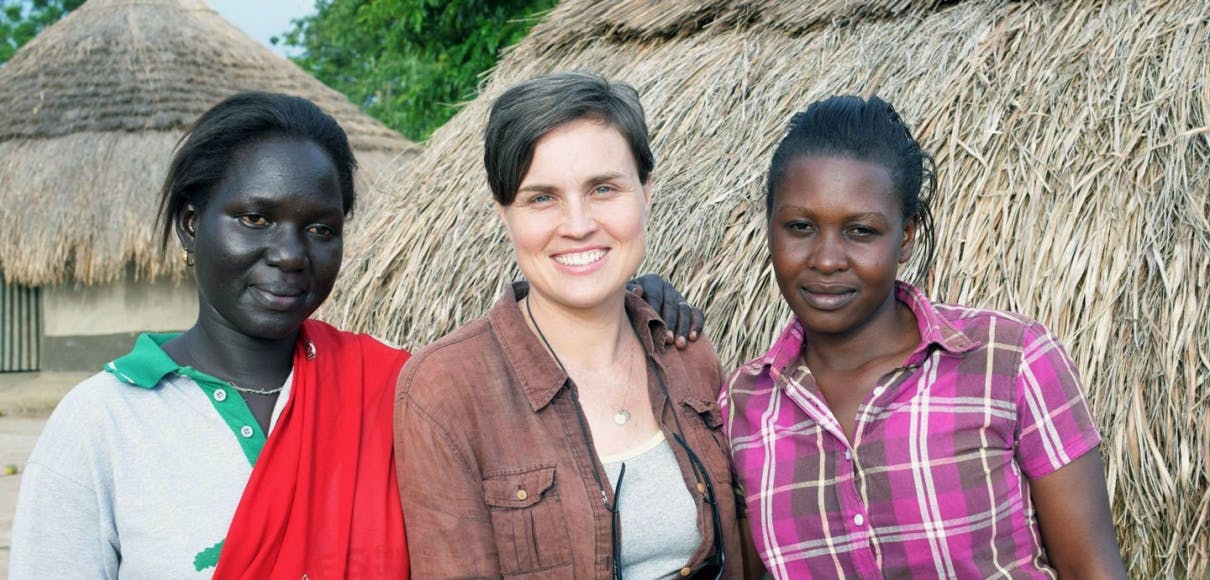In many areas of the world, small-scale farmers follow a repeatable formula: get some land, clear it, and then plant. Rather than producing bountiful harvests, these deforested lands — deprived of vital nitrogen from trees — face erosion and shrinking crop yields. Increasingly drier seasons compound the problem. But Corrie Mauldin ’98 has a solution.
As the director of East Africa Programs for Trees for the Future since 2014, Corrie and her 17-person team work with thousands of farmers in Kenya, Tanzania, and Uganda, teaching them how to create Forest Gardens. Forest Gardens, which take root over a four-year period, systematically interweave specific types of fast-growing trees for fuel and livestock fodder, fruit trees, and hardwoods among food crops. Trees for the Future — which also operates in Senegal, Cameroon, and Guinea — aims to work with 125,000 impoverished families to plant 500 million trees.
For farmers struggling to feed their families on one or few crops raised on increasingly degraded land, the transformation is nothing short of miraculous: Forest Gardens offer families sustainable food sources, livestock feed, products to sell, wood for fuel, and a significant increase in their annual income overall several years. It’s not just plants; it’s a pathway out of poverty.
It’s not just plants; it’s a pathway out of poverty.
“Working alongside industrious, traditional, rural communities who live on the front lines of limited resources, poverty, and climate change over the last several years has been a transformational experience,” Corrie said.
The biology major once intended to specialize in wildlife, not vegetation, but her destination was clear early on. “I’ve wanted to live and work in Africa since I was 7,” said Corrie. “I grew up in Utah, a very homogeneous society, so I’m not sure where the interest in Africa came from so intensely from such a young age. I had an innate sense of what I was meant to do, and it has driven most of my major life choices.”
Drawn to SPU by its Christian community and Seattle location, Corrie said she benefited from small classes and individual attention, both in the classroom and in the lab. She recalls Professor of Biology Bruce Congdon (SPU’s dean of the Division of STEM and Social Sciences) fondly. “I loved his ecology class and his unique, straightforward approach to discussing and exploring the natural world,” she said.
After graduating from SPU, Corrie volunteered with the Peace Corps working on agroforestry projects in Cameroon and realized she loved working closely with people in the field. A few years later, she earned a master’s degree in environmental science and policy with a focus on sustainable agriculture from Clark University. She worked in and around Washington, D.C., managing natural resource management and conservation programs. But Africa was calling; when the Trees for the Future position opened, she leapt.
She and her husband, Kamweti Mutu, live in his hometown of Nairobi, Kenya, with their two children, 9-year-old Charlie and Adia, who’s 6. Corrie works from home when she’s not traveling regionally, which she does about 20 percent of the time. Downtime is rare in this season of her life, but she finds respite doing yoga, taking walks with the family dog, and going on wildlife safaris: “Being in the bush close to the elements helps to rejuvenate the soul,” she said.
Corrie said her interest in working with communities to better their quality of life is rooted in her Christian upbringing.
Corrie said her interest in working with communities to better their quality of life is rooted in her Christian upbringing. “I enjoy designing and implementing projects with significant impact on the lives of thousands of marginalized rural families,” she said. “My dad was a pastor and community organizer for many years, and much of my understanding about people, communities, and how to affect constructive change came from him.”
Corrie’s work — much like farming — has short- and long-term rewards. “Our farmers have realized tremendous benefits and improved their overall quality of life within a few years of establishing their Forest Gardens,” she said. “They can better afford education for their children, health care, and critical materials for improving crop production, as well as provide their families with consistent, nutritious meals. They can also better care of their land and water resources by farming in a sustainable, productive way by tapping into local markets for consistent income and passing on fertile land to the next generation.”




